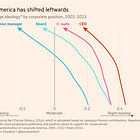Side dishes: More Super Micro, Rapoport on tax, SEC Enforcement statistics, and Buffett's cash
Here's a buffet of tasty dishes to get you through Thanksgiving, including links about my conference coverage, the latest on Super Micro, and what Buffett is really planning to do with all that cash.
Too bad the Harris/Walz campaign did not know this literature!
The theory of economic voting suggests that voter actions are influenced by economic conditions (for a detailed literature review, see Linn et al., 2010). Consistent with the theory, an extensive literature empirically documents that voters’ personal wealth (pocketbook voting) and economic conditions (sociotropic voting) are first-order determinants in voting behavior (e.g., Hibbing and Alford, 1982; Markus, 1988; Lewis-Beck and Stegmaierm, 2000).
Relatedly, Kahneman and Tversky (1984) show that voting actions are asymmetric for gains and losses; voters that incur losses are much more likely to vote based on their grievances than voters that have experienced gains. Weaver (1986) shows that voters are more sensitive “to what has been done to them than to what has been done for them.” Mehta, Mihir N. and Zhao, Wanli, Politician Careers and SEC Enforcement Against Financial Misconduct (January 29, 2020). Journal of Accounting & Economics (JAE), Forthcoming, Available at SSRN: https://ssrn.com/abstract=3532704
Writing about the Securities Enforcement Conference
Bruce Carton, host of the Securities Enforcement Forum, highlighted my writing about his DC conference twice these past two weeks, here and here.
My old friend Broc Romanek, also an SEC veteran and now writing for Cooley LLP, also highlighted my take:
Francine McKenna recently wrote an interesting piece on “The Dig” titled, “Can SEC staff hold the line? We’re not in Kansas anymore, folks.” She quotes someone well respected in our industry who believes that regardless of who the chair is and how much gutting they do, the institution that is the SEC will keep it the respectable agency that it has been for years. She then quotes a study that provides examples of how this might not always be the case.
Being a longtime creature of DC myself, I can attest to anecdotal evidence in speaking with neighbors and friends who work in agencies targeted during the previous Trump administration. When an agency is embattled, a lot of institutional knowledge tends to depart and find jobs elsewhere. And when morale is low, the work product is not good.
So we’ll have to wait and see. At least I haven’t heard discussion of making all the commissioners come from one political party like we heard last time around (scroll down on this blog I penned in 2016 about the “mixed partisan party” commissioner requirement in Section 4(a) of the ’34 Act) …
I have at least one more newsletter focused on the conference coming up, maybe two. I also, at Bruce’s invitation, plan to be at the inaugural New York edition of the conference on January 28 at the Essex House. See you there!
Gary Gensler and Commissioner Lizárraga out
Capitol Account newsletter noted the announcement:
Unusually for an agency head, Gensler even became a campaign issue when Donald Trump pledged to fire him on “Day One.”
On Thursday, Gensler ensured that won’t happen. The SEC chief announced that he would step down at noon on Jan 20. “I thank President Biden for entrusting me with this incredible responsibility,” he said. “The SEC has met our mission and enforced the law without fear or favor.”
Where have you hear the phrase “without fear or favor” most recently? Hmmm
Democrat Commissioner Lizárraga also announced his departure.
SEC Enforcement Fiscal 2024 Results
The SEC announced its fiscal year 2024 enforcement results on Friday.
Washington D.C., Nov. 22, 2024
The Securities and Exchange Commission today announced that it filed 583 total enforcement actions in fiscal year 2024 while obtaining orders for $8.2 billion in financial remedies, the highest amount in SEC history.
The 583 enforcement actions represent a 26 percent decline in total enforcement actions compared to fiscal year 2023.
The word “accounting” does not appear at all in the press release. The word “audit” appears four times, related to the Borgers and Prager Metis enforcement actions. Borgers has been taken out, individually and as a firm.
B.F. Borgers taken out of the game
On May 3 The Securities and Exchange Commission dramatically announced it was cutting public accounting firm BF Borgers off at home plate.
Prager Metis is still going!
Well in it: Prager Metis, private equity, and Autodesk
University of Cambridge Executive Master of Accounting Programme and Professor Michael Willis put out some nice photos and messages from our class at Cambridge last week.
Cornerstone Research and the NYU Pollack Center for Law & Business also put out a press release promoting their report on fiscal 2024 SEC Enforcement statistics and the Securities Enforcement Empirical Database, or SEED, a collaboration between the two.
The U.S. Securities and Exchange Commission (SEC) initiated 80 enforcement actions against public companies and subsidiaries in fiscal year 2024, marking a 12% decline from FY 2023 but still up nearly 5% compared to the nine-year historical average, according to a report released today by Cornerstone Research and the NYU Pollack Center for Law & Business.
The SEC’s FY 2024 enforcement priorities were evident in the 38 actions that were part of five sweeps, including into off-channel communications and whistleblower protections. The SEC brought nine additional actions against public companies and subsidiaries under other sweeps including:
Six actions for failing to timely file beneficial ownership and insider transaction reports
One action for failing to file a Form 13F
Two actions for violating the Marketing Rule
Most prominent was the sweep of recordkeeping failures stemming from companies’ use of off-channel communications (22 actions)…
The SEC also brought seven actions for violations of the whistleblower protection rule in FY 2024, up from three in FY 2023…Of the 80 actions, 44% (35) were initiated in September, the last month of the SEC’s fiscal year. This is the highest number of any month in SEED. The second-highest number of actions (31) occurred in FY 2023 (September) and FY 2019 (March).
Adani indictments
Tax Contingency Reserves
Michael Rapoport at Bloomberg has a great analysis of the way companies are playing games with the reserves they set aside for tax owed. This is a follow-up, of sorts, to the big story that Coca Cola owes the IRS billions but is reserving a small fraction of that, and is appealing what should be a final decision by the courts.
Amgen, Coke Set Aside Only Fraction of Billions They May Owe IRS
Coca Cola has reserved just 3%, or $465 million, of its giant possible bill. Amgen and Airbnb appear to have set aside less than half of what they may need. They’re not alone. Many companies facing IRS lawsuits have set aside relatively small amounts to pay the agency if they lose.
The trouble for the companies is, the IRS is winning more blockbuster tax cases—especially those involving transactions among related entities in a multinational group—in a marked improvement from previous decades. It has also been bolder in imposing stiff penalties, bumping up the potential tax bills companies would have to pay if they lose in court.
“If I’m an investor, I’d be P.O.'ed,” said William Byrnes, a Texas A&M University law professor who specializes in international and federal tax issues.
By under-reserving, which companies have a lot of leeway to do under accounting rules, they can avoid a hit to their earnings. Lack of disclosure about a big future potential IRS bill can make it harder for investors to evaluate a company’s financial prospects.
It could come back to haunt the company if it ultimately loses to the IRS and suddenly has to pay for a court judgment it hasn’t sufficiently prepared for.
For more on this issue see what I wrote with Olga Usvyatsky:
Super Micro Quotes
Olga Usvyatsky wrote at Deep Quarry today about the story that will not end: Super Micro.
Jacob Adelman at Barron’s has also been following this story closely and quoting Olga and I.
Amanda Gerut at Fortune gave me a lot of space to expand on the subject a couple of weeks back.
Accounting expert Francine McKenna told Fortune that the EY resignation went beyond the usual quiet exit auditors make when they slip away from an engagement. “There are noisy resignations and then there are resignations that bang a big giant gong—and this is as bad as it can get,” said McKenna, who authors The Dig newsletter.
In its resignation letter, EY wrote that it was no longer able to rely on management and the board’s audit committee, which is supposed to be made up of independent directors who oversee the company for the benefit of shareholders. “When you can’t rely on management, that’s bad,” said McKenna. “If you can’t trust the audit committee, there is something very wrong.”
After the paywall, I’ll discuss the NOCLAR proposal, the Elanco settlement, KPMG’s “rehabilitation” in the U.K., and what I believe to be the real reason for Buffett’s cash hoarding at Berkshire Hathaway.












